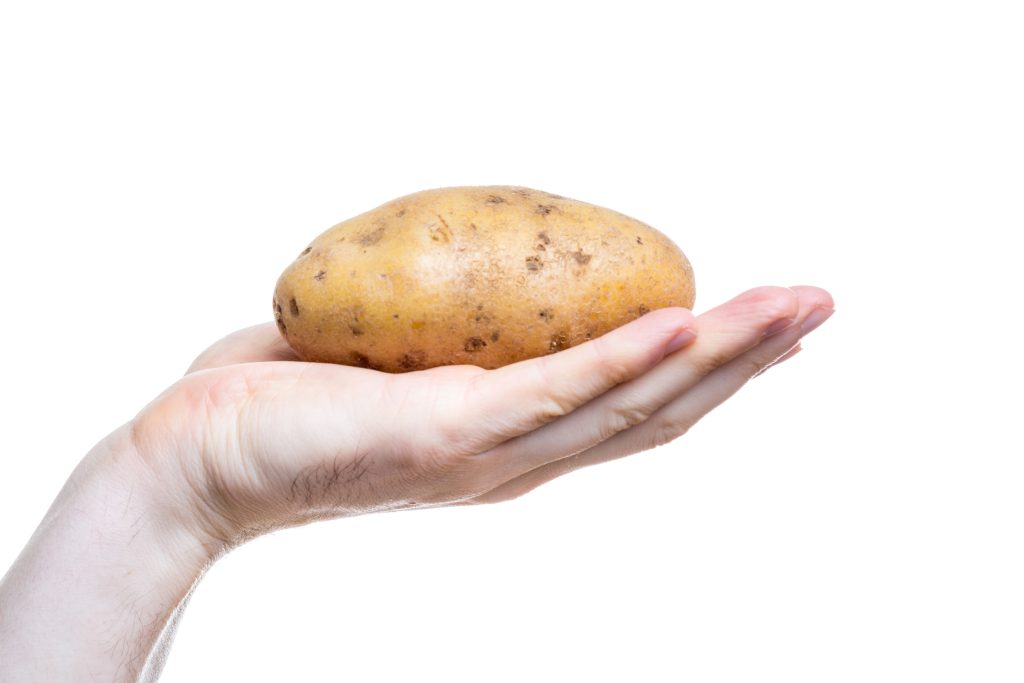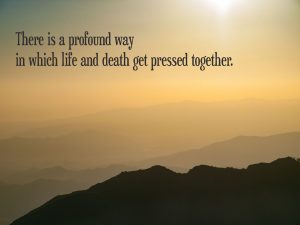hot potato
Of late, I am most likely to be found nose-buried in a book, taking in all I can about how to adjust along with and love my suddenly-tween daughter. My own counselor has described the middle school years of parenting as a sudden gear-shift, a jarring place where the comfy rules and compliance we lived with during the elementary years get set aside. It can feel like we’re driving stick shift for the first time, during our driving test, with a hormonal passenger who’s judging our driving. However, while these years are harrowing for parents, they’re even more intense and disorienting for the teen. The unfurling of an independent human life is holy and messy work.
While I have conducted my research dive on my daughter’s behalf, I’ve encountered one particular developmental concept that has left me exposed beyond my mom role. Having somehow blown by it during college and graduate school lectures on Freudian defense mechanisms, it stopped me in my mid-life tracks. In her book Untangled: Guiding Teenage Girls Through The 7 Transitions Into Adulthood, Lisa Damour explains the developmental strand of maturing through harnessing intense emotions. She describes a habit called “externalization,” which happens below the waterline of our consciousness but sends ripples into our close relationships.
Externalization happens when teens get their parents stirred up and now feeling things that they themselves need to be feeling. Disoriented, tired, and disappointed about a low test score, your daughter may come home and play it off as if she doesn’t care, and blame her teacher or you for micro-managing her. As her parent, it’s likely you will jump into the gap she doesn’t appear concerned about and get upset about it yourself. It’s as if she has tossed you an emotional hot potato; you’re not really sure why your hands are suddenly burning, and you’re even less sure why she seems so numb to it. The reality is that she probably is distressed, but needs a break from feeling it and wants to hand it off to the most caring person she knows (you) so that you’ll hold it for her. Delightful, right?

As I read Damour’s description, my mind left the page and my daughter’s infractions and drifted to a recent evening when I walked through my front door, shoulders slumped, eyes downcast, deeply sighing. I think I was hoping to communicate to my husband how exhausted my day had left me, asking him to see me without using words. Or when I called my mom after a day of hard parenting and shared only my discouragement in the hope my pain would be contagious and she’d hold it for me for a moment. While there’s nothing wrong with wanting a witness, or support at the end of a day of carrying other people’s stories, there are times I can get to a place of wanting other humans to hold my pain instead of me.
Tossing the emotional hot potato may get the burn away from my hands for a moment but it doesn’t teach me how to ask someone to sit with me while I work through my pain or weariness. It doesn’t teach me that pain passes, that if I slow and let the wave roll over me, I survive, and maybe even grow. All it really does at best is transfer to burden from my shoulders to theirs, and at worst leave them confused and me angry if they won’t take it. What if they had a long day, a harsh word from a boss, a nagging worry or anxiety? Mashed potato, all over the ground.
We crave love, meaningful support, someone to bear up both us and our burden. When God came near in Jesus, we were given touchable skin, warm breath, a face that lit up and wept. Mystery melted away. In slowing, acknowledging the painful burning of my hands, the God who made me finds me. His heart is not filled with world-weariness. His attention gives me the motivation to assess my needs and my agency. He’s plenty able to lift my chin and speak comfort. As it turns out, the unfurling of a forty-year-old life is not all that different from that of a twelve-year-old life: ever in need of His burden-bearing, everlasting arms.
 Meredith joined The Barnabas Center staff in January 2009, upon completing her Masters in Counseling from Gordon-Conwell Theological Seminary and her Bachelors in Religion and Psychology from Furman University. She counsels, leads women’s groups and teaches a seminar called “Hope in the Darkness” for those walking with individuals suffering from depression or bipolar disorder.
Meredith joined The Barnabas Center staff in January 2009, upon completing her Masters in Counseling from Gordon-Conwell Theological Seminary and her Bachelors in Religion and Psychology from Furman University. She counsels, leads women’s groups and teaches a seminar called “Hope in the Darkness” for those walking with individuals suffering from depression or bipolar disorder.




